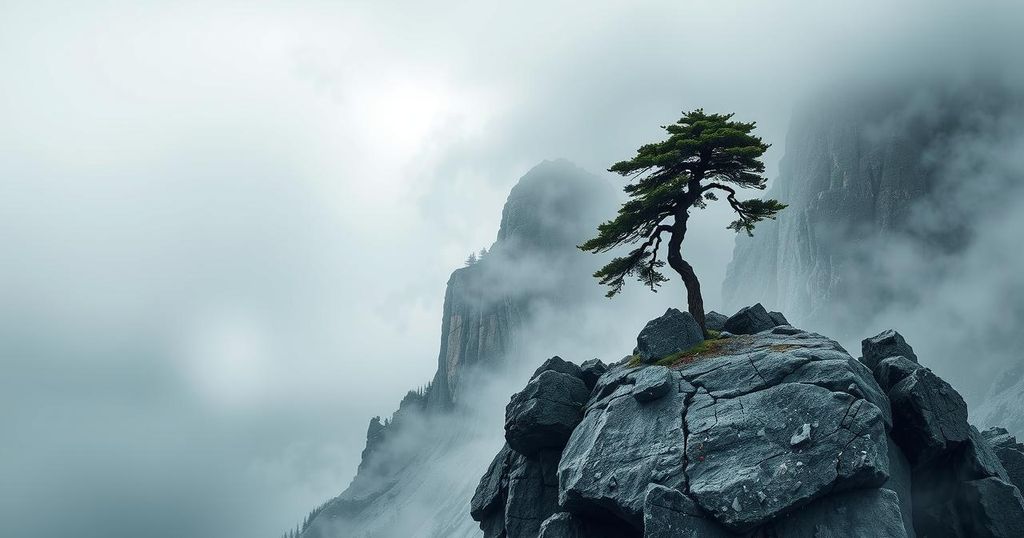Congo’s President Felix Tshisekedi has vowed to respond vigorously to rebel advances in the eastern mineral-rich regions, particularly in Goma, which has reportedly fallen to the M23 rebel coalition. Tensions rise as the government accuses Rwanda of supporting the rebels while the search for peace continues amid ongoing conflict. Analysts suggest that the unfolding crisis could lead to negotiations or further military escalation.
President Felix Tshisekedi of the Democratic Republic of Congo has committed to a robust and coordinated response to a rebel alliance that has overrun significant portions of the eastern region, which is rich in minerals, and has compelled numerous local troops to abandon their positions. In a determined address televised to the masses, he asserted that his nation would not submit to humiliation or defeat amidst ongoing appeals from regional leaders for negotiations with the insurgents.
The city of Goma, the most populous urban area in the North Kivu province, was reportedly captured by the AFC/M23 rebel coalition on Monday, according to the rebels. Although the Congolese government has yet to officially verify this claim regarding Goma’s takeover, it has acknowledged that the city is currently besieged. Reports indicate that the rebels are advancing towards South Kivu, having secured control over various towns in the region.
The Congolese government has leveled accusations against Rwanda, alleging that it is supplying the M23 rebels with weaponry and personnel. While Rwanda indirectly acknowledges these claims, it has condemned the DRC for its association with a Hutu militia that opposes the primarily Tutsi M23 group, which emerged from the CNDP. The Rwandan genocide of Tutsis and moderate Hutus in 1994 continues to cast a long shadow over these developments.
President Tshisekedi was absent from a recent summit of East African leaders aimed at addressing the escalating crisis. During that meeting, there were calls for him to engage in direct dialogue with all relevant parties, including the M23 and other armed factions voicing grievances. Rwandan President Paul Kagame emphasized that genuine dialogue among all parties is essential for attaining lasting peace and that mediators must fully understand the underlying context of the ongoing conflict.
There have been reports of fatalities among several individuals, including foreign peacekeeping personnel, as Congolese armed forces confront the rebels. In Goma, ongoing skirmishes have left hundreds of government forces disarmed by the M23, according to information provided by Uruguayan soldiers who are part of the United Nations peacekeeping operations in the area. It has also been reported that foreign mercenaries aiding the Congolese military have surrendered to Rwandan forces.
Analysts predict two potential developments as the conflict intensifies. Ladd Serwat, a senior African analyst for ACLED, points out that the M23 seizure of Goma could compel the Congolese government and its allies to pursue negotiations. Alternatively, the government could opt for a military resurgence, leading to escalated hostilities aimed at reclaiming Goma, along with possible cross-border incursions into Rwanda.
In prior statements, Tsisekedi has issued threats of military conflict with Rwanda, and Kagame has reciprocated with his own warnings. As stated previously by Kagame, “We are ready to fight. We are not afraid of anything.”
The Democratic Republic of Congo has been embroiled in conflict for decades, largely due to ethnic tensions and competition over mineral resources. The M23 rebel group, composed predominantly of Tutsi fighters, arose from the remnants of previous conflicts and has been accused of receiving support from neighboring Rwanda. The geopolitical dynamics of the Great Lakes region complicate the situation, with allegations of foreign involvement fueling the violence. Efforts by regional leaders to mediate and negotiate peace have been complicated by these tensions and historical grievances dating back to the 1994 Rwandan genocide.
As the situation in eastern Congo continues to deteriorate, President Tshisekedi’s stance emphasizes a refusal to capitulate to rebel forces, while also signaling the potential for both negotiations and increased military action. The international community’s response, alongside regional leaders’ involvement, will be crucial in determining the trajectory of the conflict. The intertwined history between Rwanda and the DRC adds layers of complexity, demanding thoughtful resolution efforts to achieve lasting peace in the region.
Original Source: edition.cnn.com




